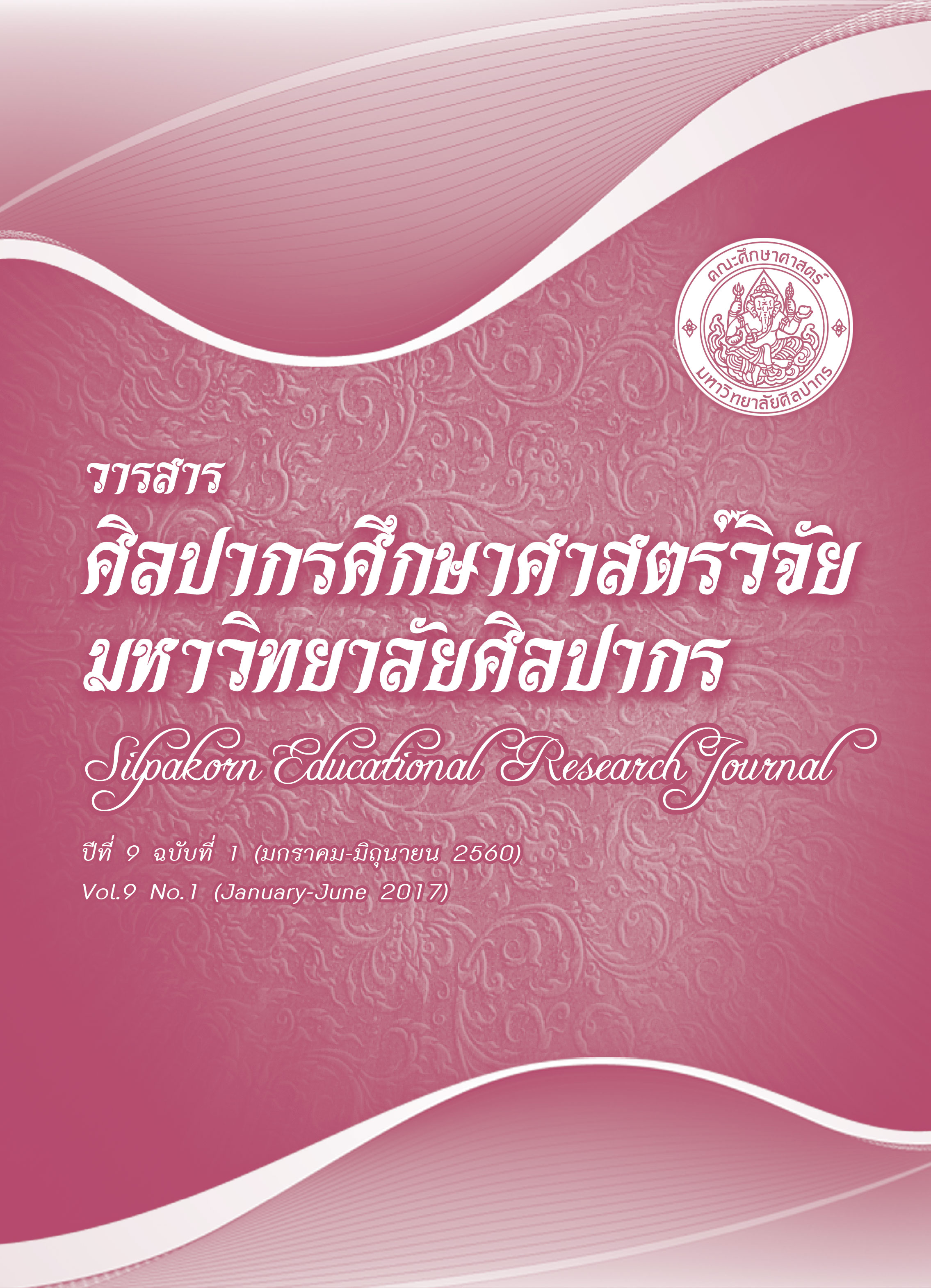การควบคุมภายในที่ส่งผลต่อการบริหารงบประมาณของสถานศึกษาที่สอนเด็กที่มีความบกพร่องทางสติปัญญา สังกัดสำนักบริหารงานการศึกษาพิเศษ (Internal Control Affecting the Budgeting Administration of Educational Institutions for Children with Intellectual Disabilities under the Bureau of Special Education Administration)
คำสำคัญ:
การควบคุมภายใน/ การบริหารงบประมาณ/ สำนักบริหารงานการศึกษาพิเศษบทคัดย่อ
การควบคุมภายในที่ส่งผลต่อการบริหารงบประมาณของสถานศึกษาที่สอนเด็กที่มีความบกพร่องทางสติปัญญา สังกัดสำนักบริหารงานการศึกษาพิเศษ
Internal Control Affecting the Budgeting Administration of
Educational Institutions for Children with Intellectual Disabilities
Under the Bureau of Special Education Administration
การวิจัยครั้งนี้มีวัตถุประสงค์เพื่อศึกษา 1) ระดับการควบคุมภายในของสถานศึกษา 2) ระดับการบริหารงบประมาณของสถานศึกษา และ 3) การควบคุมภายในซึ่งเป็นปัจจัยที่ส่งผลต่อการบริหารงบประมาณของสถานศึกษา กลุ่มตัวอย่าง ได้แก่ ผู้บริหารสถานศึกษา และครู จำนวน 181 คน ได้มาโดยการสุ่มตัวอย่างแบบแบ่งชั้นตามสัดส่วน เครื่องมือที่ใช้ในการวิจัย ได้แก่ แบบสอบถามที่สร้างขึ้นโดยผู้วิจัย การวิเคราะห์ข้อมูล ประกอบด้วย ความถี่ ร้อยละ ค่าเฉลี่ย ส่วนเบี่ยงเบนมาตรฐาน และการวิเคราะห์การถดถอยพหุคูณแบบขั้นตอน
ผลการวิจัยพบว่า 1) การควบคุมภายในของสถานศึกษาที่สอนเด็กที่มีความบกพร่องทางสติปัญญา อยู่ในระดับมากทั้งภาพรวมและรายด้าน เรียงตามลำดับจากน้อยไปหามาก ดังนี้ สภาพแวดล้อมของการควบคุม กิจกรรมการควบคุม การประเมินความเสี่ยง การติดตามประเมินผล และสารสนเทศและการสื่อสาร 2) การบริหารงบประมาณของสถานศึกษาที่สอนเด็กที่มีความบกพร่องทางสติปัญญา อยู่ในระดับมากทั้งภาพรวมและรายด้าน เรียงตามลำดับจากน้อยไปหามาก ดังนี้ การบริหารการเงิน การบริหารบัญชี การจัดสรรงบประมาณ การตรวจสอบ ติดตาม ประเมินผล และรายงานผลการใช้เงินและผลการดำเนินงาน การบริหารพัสดุและสินทรัพย์ การจัดทำและเสนอของบประมาณ และการระดมทรัพยากรและการลงทุนเพื่อการศึกษา 3) การควบคุมภายในประกอบด้วย ด้านสภาพแวดล้อมของการควบคุม ด้านสารสนเทศและการสื่อสาร และด้านการประเมินความเสี่ยง เป็นปัจจัยที่ส่งผลต่อการบริหารงบประมาณของสถานศึกษา โดยร่วมกันทำนายได้ร้อยละ 55.20 อย่างมีนัยสำคัญทางสถิติที่ระดับ .05
The purposes of this research were to study: 1) the level of the internal control; 2) the level of budgeting administration; and 3) the internal control affecting the budgeting administration. The sample selected by proportional stratified random sampling consisted of 181 administrators of educational institutions and teachers. The research instrument was a questionnaire constructed by the researcher. The data were analysed by frequency, percentage, mean, standard deviation, and stepwise multiple regression analysis.
The findings of this research were as follows:
1. The level of the Internal control of educational institutions for children with intellectual disabilities was at a high level both in overall and specific aspects. The factors were ranked by the highest to the lowest; control environment, control activities, risk assessment, monitoring and information and communications.
2. The level of budgeting administration of educational institutions for children with intellectual disabilities was at a high level both in overall and specific aspects. The factors were ranked by the highest to the lowest; financial management, accounting management, budget allocation, budget monitoring and evaluation, asset management, budget preparation and requisition, and educational resource mobilizing and investing
3. The internal control in control environment, information and communications and risk assessment together predicted the budgeting administration of educational institutions for children with intellectual disabilities at the percentage of 55.20 with statistical significance at .05.





